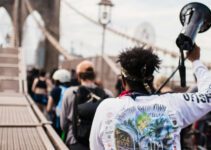In 1962, Rachel Carson’s groundbreaking book « Silent Spring » brought attention to the devastating effects of DDT on birds, acting as a warning signal for environmental issues. Since then, more ominous signs have emerged, with climate change posing a significant threat to humanity. The impacts of climate change are disproportionately felt by the poor, marginalized, and oppressed, yet global emissions continue to rise. Capitalism fuels carbon output, while indigenous peoples are stripped of their land stewardship, facing environmental toxins that have severe consequences on their lives.
In the face of governmental inaction, it becomes crucial to explore alternative perspectives on climate justice. Several books offer insightful and well-researched approaches to the issue, drawing from indigenous wisdom, scientific innovation, grassroots activism, anthropology, and botany. These diverse angles shed light on potential solutions, emphasizing the importance of interdependence over independence in addressing climate change.
Naomi Klein’s « This Changes Everything: Capitalism vs. The Climate » challenges the notion that technology or incremental divestment from fossil fuels can solve the crisis. Klein argues that fundamental changes to our capitalist systems are necessary to avert catastrophic warming. Similarly, Anna Lowenhaupt Tsing’s « The Mushroom at the End of the World » uses the matsutake mushroom as a metaphor for environmental renewal in the face of capitalist exploitation.
Mary Robinson’s « Climate Justice: Hope, Resilience, and the Fight for a Sustainable Future » advocates for a narrative perspective on climate justice, highlighting the interconnectedness of climate change, human rights, equality, and individual empowerment. Dina Gilio-Whitaker’s « As Long as Grass Grows: The Indigenous Fight for Environmental Justice, from Colonization to Standing Rock » explores the history of Indigenous environmental activism and offers new approaches to addressing environmental injustices.
These books provide valuable insights and perspectives on climate justice, urging readers to rethink current paradigms and take action to create a more sustainable future for all. The book, « Braiding Sweetgrass: Indigenous Wisdom, Scientific Knowledge and the Teachings of Plants » by Robin Wall Kimmerer, was recommended by both the New York Public Library and BuzzFeed News for the 2020 United States elections as essential reading on the topic of climate change.
Indigenous botanist and MacArthur « genius, » Robin Wall Kimmerer, saw unexpected success with her book « Braiding Sweetgrass. » Despite not being well-known at the time of its release and having only a small marketing campaign, the book became a National Bestseller. Kimmerer believes that her message resonates with readers because of the need for alternative wisdom in the face of societal challenges and injustices. She emphasizes the importance of interdependence and values connection, especially with nature.
« Braiding Sweetgrass » combines indigenous traditions with environmental sciences to offer a perspective on survival over millennia. The book addresses the feelings of helplessness in the face of ecological devastation and emphasizes the intelligence and interconnectedness of all life forms.
Richard Powers’ Pulitzer Prize-winning book, « The Overstory, » is described as an activist work that highlights the natural world and the existential crisis facing human civilization. The novel focuses on trees and suggests that the solution to environmental issues may lie in empathizing with non-human life forms. « The Overstory » has been praised for its inventive structure and its ability to reshape environmental fiction.
« Toxic Communities: Environmental Racism, Industrial Pollution, and Residential Mobility » by Dorceta Taylor is considered a seminal work in environmental justice scholarship. Taylor explores the contamination of minority and low-income communities in the US, shedding light on environmental racism and its lasting impact on society.
« The Great Displacement: Climate Change and the Next American Migration » by journalist Jake Bittle tells the stories of individuals already affected by climate change-induced migration. The book paints a vivid picture of the changing human geography and warns of the challenges to come as a result of climate instability. Bittle’s work is seen as a valuable addition to the genre of climate non-fiction, offering insights into the evolving environmental landscape.
La Grande Dislocation: Un regard percutant sur les défis de l’exode
L’article The Great Displacement soulève une question urgente: « lorsque nous sommes forcés de quitter les endroits qui nous ont longtemps définis, que trouverons-nous de l’autre côté? » (Elizabeth Rush, auteure de Rising: Dispatches from the New American Shore)
Les nouvelles voies de la révolution selon Andreas Malm
Le livre How to Blow Up a Pipeline ne contient pas de véritables instructions pour faire exploser quoi que ce soit. Au contraire, l’ouvrage aborde de manière puissante la frustration d’Andreas Malm face à l’orthodoxie du mouvement, dénonçant ce qu’il appelle « la fin de la politique révolutionnaire », un problème qui mérite l’attention de la révolution. Malm, auteur suédois et professeur associé en écologie humaine à l’Université de Lund, lutte avec force contre le désespoir et l’impuissance, démolissant de manière brutale les « fatalistes du climat » qui prônent l’abandon. Pour Malm, abandonner serait l’équivalent moral d’être un spectateur passif de la mort d’un être cher.
Les ravages de l’environnement sur l’intelligence américaine
Dans son ouvrage A Terrible Thing to Waste, Harriet A. Washington explore en profondeur comment les crises environnementales affectent principalement les personnes de couleur défavorisées. Elle soutient que le QI, bien qu’imparfait, est un outil utile pour mesurer les dommages cognitifs causés par les dangers environnementaux. Washington, écrivaine et éthicienne médicale américaine, dénonce de manière méthodique le racisme environnemental et ses effets catastrophiques, en particulier sur les capacités cognitives des enfants américains. Son message est sombre, mais elle incite le lecteur à agir plutôt qu’à céder au désespoir.
En conclusion, ces ouvrages offrent des perspectives uniques sur les défis urgents auxquels notre société est confrontée, incitant à la réflexion et à l’action pour un avenir plus juste et durable.



